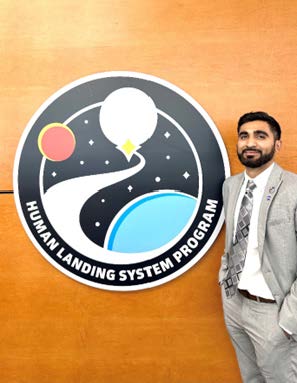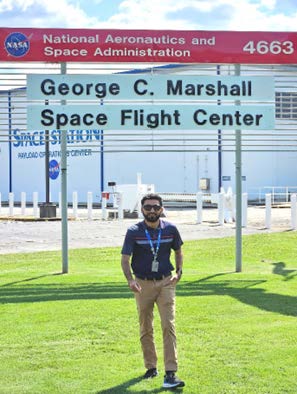Student Stories
Aerospace Engineering Internship Story: NASA


Harsh Gandhi
Aerospace Engineering
What company did you intern with and where are they located?
I worked with NASA at the Marshall Space Flight Center (MSFC), which is located in Huntsville, Alabama.
How did you identify and apply for your internship? Are there any specific resources you used to find the opportunity (i.e., Handshake, career fairs, other recruitment events)?
I discovered this opportunity through LinkedIn and applied directly via the NASA internship portal. The CDCR office provided support in refining my resume and guiding me through various internship-seeking resources.
What was the application process like?
The application process was fairly straightforward. I applied to several internships and received a response from one. After the interview, which was scheduled within two weeks of my application, I was offered the position. However, the final decision wasn't communicated until about two months after the interview.
Tell us about your internship experience. What types of tasks and projects did you engage in? Was there a particular project or part of the experience you learned the most from?
During my internship at NASA MSFC, I worked on the Human Landing Systems (HLS) program and focused primarily on thermal testing and analysis for lunar landers. My key responsibility was assisting with the Thermal Vacuum Testing (TVAC) of lunar lander test articles, where we simulated the extreme space environment to evaluate the lander's thermal performance. I also worked with Multi-Layer Insulation (MLI), helping to optimize its design and placement to minimize heat transfer on the lander. I learned the most from this project because it deepened my understanding of thermal analysis and the importance of precise environmental testing in space missions.
In what ways did this internship help you prepare for your next destination after Auburn?
This experience equipped me with real-world engineering skills and gave me a hands-on understanding of how large-scale aerospace projects are executed. I improved my technical problem-solving skills and gained experience working with industry-standard software like Thermal Desktop, LabVIEW, and Creo. Additionally, it helped me build professional relationships with NASA engineers, which will be valuable for future networking and career opportunities.
In what ways did your coursework or other experiences at Auburn prepare you for your internships? Are there specific topics or skills you learned from classes that you put into practice on the job?
My coursework in Thermodynamics, Aerodynamics, and Aerospace Structures was directly relevant to my work at NASA. For instance, I applied principles from these courses to understand heat transfer and thermal analysis during the thermal testing of lunar landers. Additionally, my research experience in the Advanced Materials and Composites Lab under Dr. Gururaja helped me build a strong foundation in structural testing and analysis, which proved valuable during the TVAC testing.
Are there specific topics or skills you learned from class that you put into practice on the job?
Yes, several skills I learned in class were directly applicable during my internship. My proficiency with MATLAB was essential for analyzing thermal test data and running simulations. Additionally, the presentation skills I developed through project work at Auburn helped me effectively communicate complex technical information to my team and supervisors. I also utilized my CAD skills to review and modify designs for thermal testing setups, which contributed to optimizing test configurations.
Do you have any advice for other students looking for internships like yours?
Start applying early and take advantage of the resources available at the CDCR office. Tailor your resume for each opportunity and highlight relevant technical skills. Go through the mock interviews provided by CDCR. Networking is also important—attend career fairs and keep your LinkedIn profile updated. Be persistent, as securing a NASA internship can be competitive, but the experience is incredibly rewarding. During the internship, ask questions everywhere, in every meeting and/or presentation.

